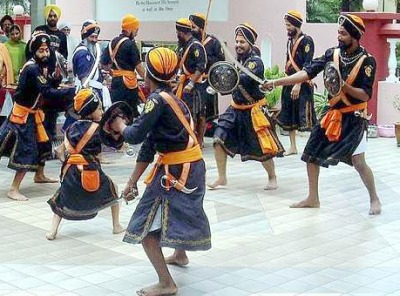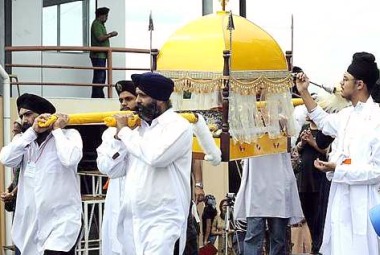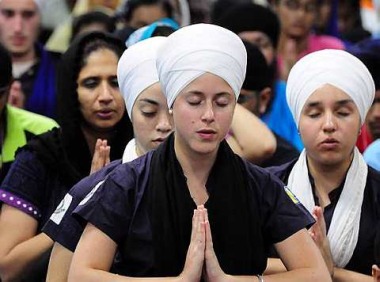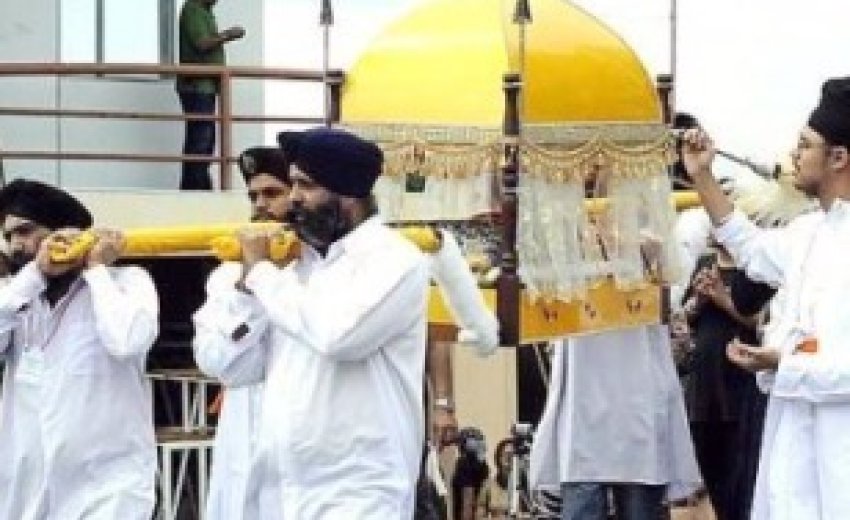Saturday January 8, 2011: SWEDISH siblings Manjoth Singh, 11, and his six-year-old sister Harjeevan Kaur were spellbound upon seeing a bevy of sparkling clean BMWs and vintage cars lead a procession carrying the Guru Granth Sahib Ji (Sikh holy book) with more than 1,000 youths in colorful turbans and dupattas (shawl) in tow at the opening of the week-long annual samelan (Sikh youth camp) in Rembau, Negri Sembilan recently.
 |
| Youngest of them all: Eight-year-old Manpreet Singh (second from left) ‘defending’ himself from being attacked by four ‘enemies’ in this gatka (Sikh martial art) demonstration. |
Both were also captivated by the dashing Dashmesh Bagpipers and a group of dholis (Sikh traditional drum players) accompanying the convoy, taking turns to mesmerise the crowd with their brand of music as the procession made its way to the main hall at Sekolah Teknik Dato Maharaja Lela.
“This is awesome, it is a welcoming ceremony fit for a king. It’s only the first day and we are already having so much fun,” said Manjoth, brimming with excitement.
Harjeevan, who was held by her mum Susheel Kaur, said she had never seen anything like that back home.
“I wish to get a recording of this to show it to my friends back home in Stockholm,” she said.
They were among some 1,500 youths and volunteers who had gathered here to attend the Rakan Muda-sanctioned Sikh annual samelan — an international Sikh youth camp touted to be the biggest of its kind in the world.
And Rembau got to be the proud host for the 47th edition of the Sikh camp after a two-year break, happily embracing participants from as far as the United States, parts of Europe, Australia, India and the Asean region.
Manjoth said back in Sweden, such youth camps attracted between 50 and 60 youths, including those who came from France, Germany and Denmark.
“It’s a lot more happening here. I really wish to be back here every year,” he said.
Preparations for the event began days earlier with youths from several parts of the country gathering at the school for gotong royong exercise. Whatever broken was fixed, floors were polished, toilets were cleaned and the school’s surroundings spruced up to ensure the participants had a memorable stay.
 |
| Teamwork in progress: The participants passing a marble with a piece of paper in a game to instil discipline and the importance of teamwork in finding solutions to problems. |
On the opening day, two volumes of the Guru Granth Sahib Ji, which the Sikhs consider as their living guru, were brought in a convoy with youths clad in banaa and salwaar kameez (Sikh traditional attire) cheering it on.
This was followed by a Nishaan Sahib (flag raising) ceremony as well as the singing of Negaraku.
As soon as the Jalur Gemilang was raised, the youths were given their programs for the entire week — with learning modules, social dynamics and networking making up the core of the program.
National Sikh Youth Organisation head Amarjeet Singh said apart from educating the youths on their religion and traditions, the objectives of the camp were to mould them into effective leaders, to lead a disciplined lifestyle, to instill the spirit of voluntarism, to always remain loyal to one’s country and to respect peoples of other faiths.
 |
| Sacred duty: The Guru Granth Sahib Ji, or the Sikh holy book being carried in a palanquin and taken into the school during the opening of the samelan. |
“We hold the camps during the school breaks so that more can attend. We help them plan their career paths and want them to remain motivated at all times,” he said adding that several guest speakers were also invited to enlighten the youths on issues they faced.
The youths were broken into groups known as Nikey Khalse (five years and below), Mighty Khalse (six to 12), Kool Khalse (13 and 14 years) and Juniors Khalse (15 and 16 years), Senior Khalse (17 years an above).
Amarjeet said a typical day at the samelan for participants started as early as 5 a.m. with morning prayers and the singing of the national anthem. After breakfast, they were divided into groups and given assignments based on modules specially tailored for youths.
While morning lessons were underway, a small group of volunteers prepared vegetarian meals for the youths as well as some 500 visitors to the camp daily.
The lessons continued after lunch and after a tea break at 4pm, the youths were taken to the field for games and other recreational activities.
During the camp, younger Sikhs were also taught the art of turban-tying and to read the Gurmukhi script. It is also inculcated in them not to consume tobacco and alcohol as these were strictly prohibited in Sikhism.
 |
| Soul-searching: A group of participants from the Miri Piri Academy in the United States meditating during the early morning prayers. |
Foreign groups, which included members of the Miri Piri Academy and the Bir Khalsa International, a group which promoted the Sikh martial art of gatka were also brought in to enlighten the participants on Sikh religion, culture and traditions.
The Miri Piri Academy was set up by American Sikhs who were based both in India and the United States. Bir Khalsa International recently came in as second runner-up in 'India’s Got Talent' show.
Eight-year-old Manpreet Singh, the youngest of the 12-member Bir Khalsa group was also amazed when he saw the activities.
“I never knew there were so many Sikhs in this part of the world. I hope to be back here again to be able to explore this beautiful multi-diversed country of yours,” he said.
Amarjeet said the participants who did well in their projects were given rewards to encourage them to work even harder.
“We gave them presents like iPod shuffle and reading material for their effort. We want them to become good citizens of this country and on our end, we would continue to organize such camps,” he added.
